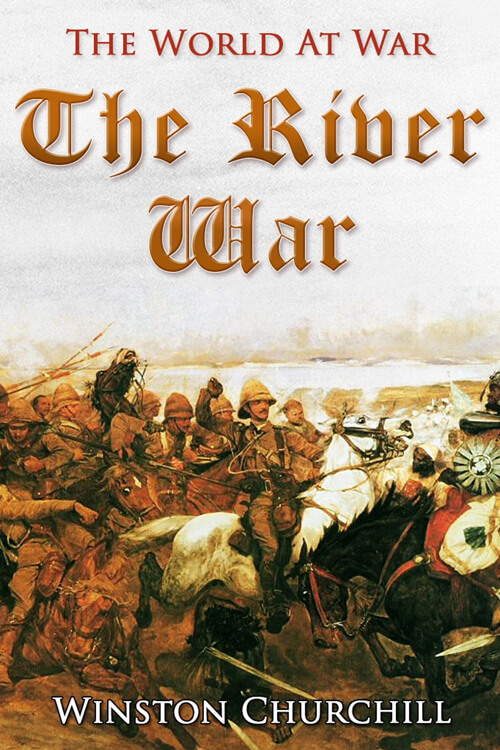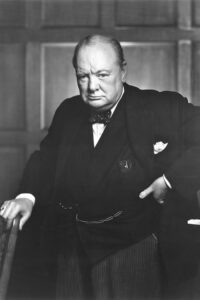
The River War, An Account of the Reconquest of the Sudan
The northeastern quarter of Africa’s continent is drained and watered by the Nile. Among and about the headstreams and tributaries of this mighty river lie the wide and fertile provinces of the Egyptian Soudan. Situated in the very center of the land, these remote regions are on every side divided from the seas by five hundred miles of mountain, swamp, or desert. The great river is their only means of growth, their only channel of progress. It is by the Nile alone that their commerce can reach the outer markets or European civilization can penetrate the inner darkness. The Soudan is joined to Egypt by the Nile, as a diver is connected with the surface by his air pipe. Without it, there is only suffocation. Aut Nilus, aut nihil!
The town of Khartoum, at the confluence of the Blue and White Niles, is the point on which the trade of the south must inevitably converge.
It is the great spout through which the merchandise collected from a wide area streams northwards to the Mediterranean shore. It marks the extreme northern limit of the fertile Soudan. Between Khartoum and Assuan the river flows for twelve hundred miles through deserts of surpassing desolation. At last, the wilderness recedes and the living world broadens out again into Egypt and the Delta. It is with events that have occurred in the intervening waste that these pages are concerned.
The real Soudan, known to the statesman and the explorer, lies far to the south—moist, undulating, and exuberant. But there is another Soudan, which some mistake for the true, whose solitudes oppress the Nile from the Egyptian frontier to Omdurman. This is the Soudan of the soldier. Destitute of wealth or future, it is rich in history. The names of its squalid villages are familiar to distant and enlightened peoples. The barrenness of its scenery has been drawn by skillful pen and pencil. Its ample deserts have tasted the blood of brave men.
Its hot, black rocks have witnessed famous tragedies. It is the scene of the war. This great tract, which may conveniently be called ‘The Military Soudan,’ stretches with apparent indefiniteness over the face of the continent.
Level plains of smooth sand—a little rosier than buff, a little paler than salmon—are interrupted only by occasional peaks of rock—black, stark, and shapeless. Rainless storms dance tirelessly over the hot, crisp surface of the ground.
Read or download Book
Winston S. Churchill
Sir Winston Leonard Spencer Churchill (30 November 1874 – 24 January 1965) was a British statesman, soldier, and writer who twice served as Prime Minister of the United Kingdom, from 1940 to 1945 during the Second World War, and again from 1951 to 1955.
Biography.
Apart from two years between 1922 and 1924, he was a Member of Parliament (MP) from 1900 to 1964 and represented five constituencies. Ideologically an adherent to economic liberalism and imperialism, he was for most of his career a member of the Conservative Party, which he led from 1940 to 1955. He was a member of the Liberal Party from 1904 to 1924. Of mixed English and American parentage, Churchill was born in Oxfordshire into the wealthy, aristocratic Spencer family. He joined the British Army in 1895 and saw action in British India, the Mahdist War (also known as the Anglo-Sudan War), and the Second Boer War. He later gained fame as a war correspondent and wrote books about his campaigns. Elected a Conservative MP in 1900, he defected to the Liberals in 1904.
In H. H. Asquith’s Liberal government, Churchill served as President of the Board of Trade and Home Secretary, championing prison reform and workers’ social security. As First Lord of the Admiralty during the First World War, he oversaw the Gallipoli campaign. However, after it proved a disaster, he was demoted to Chancellor of the Duchy of Lancaster. He resigned in November 1915 and joined the Royal Scots Fusiliers on the Western Front for six months. In 1917, he returned to government under David Lloyd George. He served successively as Minister of Munitions, Secretary of State for War, Secretary of State for Air, and Secretary of State for the Colonies, overseeing the Anglo-Irish Treaty and British foreign policy in the Middle East. After two years out of Parliament, he served as Chancellor of the Exchequer in Stanley Baldwin’s Conservative government, returning the pound sterling in 1925 to the gold standard at its pre-war parity, a move widely seen as creating deflationary pressure and depressing the UK economy.






